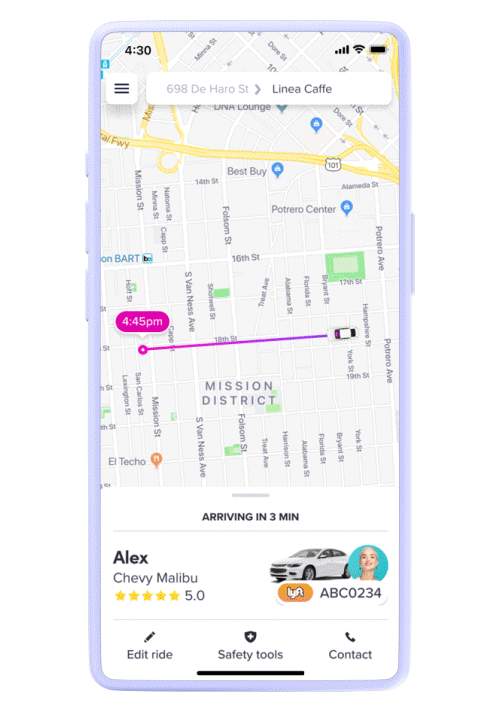
We’re pleased to announce that Leah Page, ADT’s Vice President of Emerging Business and Mobile Security, has joined Lyft’s Safety Advisory Council. With a focus on human protection and more than 145 years of security experience, ADT shares Lyft’s commitment to making transportation safer for everyone.
Page’s appointment to the Safety Advisory Council comes after years of working with Lyft to develop a seamlessly integrated system to enhance rideshare safety, culminating in the launch of Emergency Help, supported by ADT.
A first-in-the-industry product, Emergency Help was designed to ensure riders and drivers can receive expedient help for any in-ride emergency, whether or not they can place a phone call to 911. The feature also provides care and real-time support in uncomfortable situations that don’t require immediate involvement from authorities.
How it works
Riders and drivers are able to quickly connect with an ADT security professional silently or by voice. Riders can choose whether they want ADT to text them, call them or silently alert 911 on their behalf (to promote focused driving, drivers only have the option to request a call from ADT). If requested, ADT will alert authorities so they can arrive at the user’s live location, equipped with ride details like the vehicle’s make and model, license plate number and the intended drop-off location. If someone signals they need help and subsequently does not respond to a call or text from ADT, ADT will contact 911 and share the user’s location and other relevant information.
More recently, ADT’s capabilities were integrated into Smart Trip Check-in, which monitors rides for certain irregularities and proactively reaches out to riders and drivers to offer support. ADT’s integration allows riders and drivers to receive emergency assistance when Lyft reaches out, without having to speak a word.

Real-world examples
In the nearly two years that Emergency Help has been available to Lyft users, it’s been used countless times to provide critical real-time support for in-ride situations. Below are just a few real-world examples:
- Before entering their Lyft ride, a rider in Texas sent her driver a message to let him know they were escaping a domestic violence situation. As the driver waited for the rider to exit the house, he contacted ADT to be on standby to notify police in case something happened. Thankfully, the rider came out with their daughter without incident, and was taken to a safe location by the driver.
- In Virginia, a rider with a history of seizures noticed the warning signs and alerted her driver that she was about to experience a seizure. The driver contacted ADT, who dispatched an ambulance that arrived at the rider’s destination.
- A rider in Illinois silently texted ADT with concerns that her driver was not following the GPS. An ADT agent reassured the rider by continuing to chat and following her location throughout the ride, and called after drop-off to make sure she arrived home safely.
- A Texas driver called ADT through Emergency Help to report that she had been carjacked. ADT immediately notified law enforcement, shared the exact location where the crime occurred, and were able to continuously pass along the carjacker’s live location to the authorities. Officers were able to locate the carjacked vehicle within 30 minutes of the crime.
“We were honored to work with Lyft to pioneer Emergency Help, a first-of-its-kind in-app resource that places empowering safety tools in the hands of riders and drivers,” said Page. “We at ADT share Lyft’s commitment to make transportation safer for everyone, and I can’t wait to further this mission through my involvement in their Safety Advisory Council.”
“Leah and the entire ADT team have been incredible partners over the years as we worked together to scale ADT’s security processes to on-platform incidents, design the product so that users can easily find it when they need it, and bring Emergency Help to life in the Lyft app for our millions of riders and drivers,” said Naomi Yarin, Head of Community Safety Products. “We couldn’t be more thrilled to officially welcome her into Lyft’s Safety Advisory Council.”
Lyft’s Safety Advisory Council — a diverse set of external experts from sexual assault and violence prevention organizations as well as local and national law enforcement officials — was founded in January 2020. The Council helps identify additional opportunities to enhance safety, work through complex safety decisions, and anticipate any unintended consequences of product or policy changes.
ADT joins representatives from RAINN, It’s On Us, the National Sheriffs’ Association, the National Association of Women Law Enforcement Executives, the National Organization of Black Law Enforcement Executives, the Human Rights Campaign, United State of Women, and the Black Women’s Roundtable.
Read this on the Lyft blog.